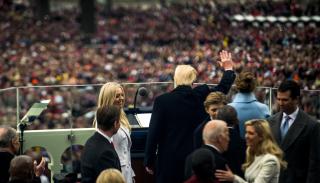Call for papers - 16th Annual Conference of the US Foreign Policy Working Group

Shaping a New World order: US foreign policy after the end of the post-Cold War era.
4-5 September 2024, Faculty of Social Science and Public Policy, Defence Studies Department, King's College London.
Keynote speaker: Professor Jennifer M Lind
In continuity with last year’s theme – which focused on the role of the United States in an era of strategic competition – the 2024 US Foreign Policy Working Group Annual Conference will unpack how US foreign policy is adapting to and actively pursuing change of the Liberal International Order, as a reaction to the acknowledgement that ‘[t]he post-Cold War world is over, and there is an intense competition underway to determine what comes next’ – as Secretary of State Anthony Blinken pointed out. This confirms key assessments of strategic documents of both the Trump and Biden administrations on the inter-state competition. Panels, papers and roundtables will address the role of the United States in response to the Russo-Ukrainian War, the Biden administration’s efforts at remaking a liberal order by updating alliances within the West, long-term political, economic, and military competition with China, the future of economic engagement, the challenges posed to US foreign policy by the rise of nationalist populism and the aftermath of the January 6th Capitol riot – including the possibility of a second Trump administration – as well as the revitalization of NATO and US alliances and partnerships under President Biden following on from Donald Trump’s ‘America First’ stance. To this effect, the conference seeks to attract high-profile academic and non-academic keynote speakers and participants from the United States to facilitate and promote a stimulating exchange of thoughts on the nature of American leadership in international politics.
Beyond the conference theme, we invite proposals of individual papers, panels, and roundtables on any aspect of US foreign policy, contemporary or historical.
We also welcome proposals from a range of scholarly perspectives, including International Relations; Political Science; History; Economics; and other related disciplines. Possible topics for papers and panels might include US foreign policy in relation to race, gender, and human rights; regional/global power shifts; grand strategy; terrorism and counterterrorism; cyberwarfare/security; energy security; nuclear weapons; trade and finance; multilateral organisations and institutions. We are also supportive of panels that incorporate outside perspectives such as Chinese, Russian, Iranian or European reflections on US foreign policy.
We are keen for papers to reflect the diversity of US foreign policy scholars and expertise by encouraging papers from women and BAME delegates.
We will also organise a conference dinner, which all delegates are invited to and can attend for an extra fee, paid at the point of conference registration. The pricing structure for conference attendance is as follows:
BISA members: attendance is free, surcharge for conference dinner: £50
Non-BISA members: attendance is £75, surcharge for conference dinner: £50
Non-BISA ECRs: attendance is £25, surcharge for conference dinner: £25
Proposals for individual papers (200 word abstract, including institutional affiliation), panels (4 paper abstracts plus chair/discussant), and roundtables (5 participants, incl. chair) should be submitted to the BISA USFP Working Group convenor, Dr Zeno Leoni: usfp.group@bisa.ac.uk
The deadline for all submissions is Friday 28 June 2024.
Please also indicate with your submission if you wish to attend the conference dinner on Thursday, 5 September.
For regular news and updates on the BISA USFP Working Group, you can also follow us on Twitter: @USFPgroup; and join our Facebook group: https://www.facebook.com/groups/USFPWG/
Image by Staff Sgt. Marianique Santos of the U.S. Air Force. As a work of the U.S. federal government, the image or file is in the public domain in the United States.